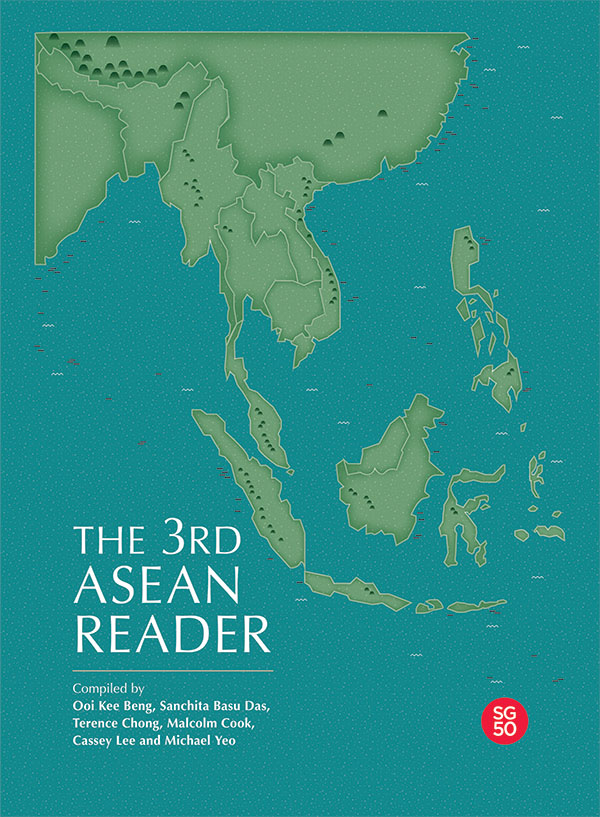Book contents
- Frontmatter
- Contents
- Preface
- Forewords to the First and Second ASEAN Reader: ASEAN: Conception and Evolution
- Forewords to the First and Second ASEAN Reader: ASEAN: The Way Ahead
- Forewords to the First and Second ASEAN Reader: New Challenges for ASEAN
- SECTION I ASEAN: THE LONG VIEW
- SECTION II COUNTRY ANALYSES
- SECTION III COMPARATIVE ANALYSES OF THE REGION
- Southeast Asian Societies
- The Southeast Asian Economy
- Southeast Asian Politics
- SECTION IV INTERNATIONAL DEVELOPMENTS
- SECTION V INSTITUTIONS OF ASEAN
- SECTION VI ASSESSING ASEAN'S INTERNAL POLICIES
- ASEAN Political Security Community
- ASEAN Economic Community
- ASEAN Socio-Cultural Community
- SECTION VII ASSESSING ASEAN'S EXTERNAL INITIATIVES
- ASEAN Processes
- 61 Driving East Asian Regionalism: The Reconstruction of ASEAN's Identity
- 62 Pakistan, SAARC and ASEAN Relations
- 63 Neither Skepticism nor Romanticism: The ASEAN Regional Forum as a Solution for the Asia-Pacific Assurance Game
- 64 ASEAN Plus Three and the Rise of Reactionary Regionalism
- 65 How the East Asia Summit Can Achieve its Potential
- 66 ‘Talking Their Walk’? The Evolution of Defense Regionalism in Southeast Asia
- 67 ASEAN FTAs: State of Play and Outlook for ASEAN's Regional and Global Integration
- 68 Taking ASEAN+1 FTAs Towards the RCEP
- 69 RCEP and TPP: Comparisons and Concerns
- 70 Enhancing the Effectiveness of CMIM and AMRO: Selected Immediate Challenges and Tasks
- ASEAN's Major Power Relations
- SECTION VIII SOUTHEAST ASIA: PERIPHERAL NO MORE
- Bibliography
- The Contributors
- The Compilers
63 - Neither Skepticism nor Romanticism: The ASEAN Regional Forum as a Solution for the Asia-Pacific Assurance Game
from ASEAN Processes
Published online by Cambridge University Press: 22 June 2017
- Frontmatter
- Contents
- Preface
- Forewords to the First and Second ASEAN Reader: ASEAN: Conception and Evolution
- Forewords to the First and Second ASEAN Reader: ASEAN: The Way Ahead
- Forewords to the First and Second ASEAN Reader: New Challenges for ASEAN
- SECTION I ASEAN: THE LONG VIEW
- SECTION II COUNTRY ANALYSES
- SECTION III COMPARATIVE ANALYSES OF THE REGION
- Southeast Asian Societies
- The Southeast Asian Economy
- Southeast Asian Politics
- SECTION IV INTERNATIONAL DEVELOPMENTS
- SECTION V INSTITUTIONS OF ASEAN
- SECTION VI ASSESSING ASEAN'S INTERNAL POLICIES
- ASEAN Political Security Community
- ASEAN Economic Community
- ASEAN Socio-Cultural Community
- SECTION VII ASSESSING ASEAN'S EXTERNAL INITIATIVES
- ASEAN Processes
- 61 Driving East Asian Regionalism: The Reconstruction of ASEAN's Identity
- 62 Pakistan, SAARC and ASEAN Relations
- 63 Neither Skepticism nor Romanticism: The ASEAN Regional Forum as a Solution for the Asia-Pacific Assurance Game
- 64 ASEAN Plus Three and the Rise of Reactionary Regionalism
- 65 How the East Asia Summit Can Achieve its Potential
- 66 ‘Talking Their Walk’? The Evolution of Defense Regionalism in Southeast Asia
- 67 ASEAN FTAs: State of Play and Outlook for ASEAN's Regional and Global Integration
- 68 Taking ASEAN+1 FTAs Towards the RCEP
- 69 RCEP and TPP: Comparisons and Concerns
- 70 Enhancing the Effectiveness of CMIM and AMRO: Selected Immediate Challenges and Tasks
- ASEAN's Major Power Relations
- SECTION VIII SOUTHEAST ASIA: PERIPHERAL NO MORE
- Bibliography
- The Contributors
- The Compilers
Summary
Established in 1994 with the member-ship of eighteen states, the ASEAN Regional Forum (ARF) is the sole region-wide multilateral security institution in the post-Cold War Asia-Pacific. While it is primarily a dialogue forum without binding decision-making and enforcement mechanisms, it has gradually institutionalized numerous confidence-building measures (CBMs) among the member states. As its name strongly suggests, the members of the Association of Southeast Asian Nations (ASEAN) are in the ‘driver's seat’. Furthermore, the ASEAN states, it is often argued, have successfully transplanted their principles and practices for mutual interaction to the ARF setting. These codes of behavior, often called ‘the ASEAN Way’, are characterized by ‘a high degree of discreetness, informality, pragmatism, expediency, consensus-building, and non-confrontational bargaining style’, in sharp contrast to ‘adversarial posturing and legalistic styles’ found in the West (Acharya 1997: 329).
What is the nature of the ARF? In answering this question, specialists have come to loosely form two competing camps: structural realists on the one hand, and the advocates of what Amitav Acharya (1999: 25, n. 15) calls ‘institutionalism with a constructivist orientation’ (constructivists hereafter) on the other. Structural realists regard the ARF essentially as an epiphenomenon and remain highly skeptical about the efficacy of the multilateral institution in Asia-Pacific power politics. Constructivists, on their part, place significant emphasis on a new regional identity being formed, particularly around the ASEAN Way. They argue that old state interests are profoundly transformed to the extent that materialist perspectives like structural realism are becoming increasingly inadequate in the study of the ARF. Power politics in the region, according to constructivists, is changing slowly yet steadily. Each position is epitomized by the two quotations at the beginning of this article.
These two dominant perspectives on the ARF have serious limitations, however, because they fail to adequately capture the utilities that the ARF provides to its member states. The ARF exists because it satisfies some needs felt by its member states. Its rules and practices signify internationally agreed solutions for these needs. The member states would have little motivation to spend their precious resources to sustain ARF activities if the ARF did not supply what they demand. In short, the ARF exists because of its functions; its existence serves the member states’ interests.
- Type
- Chapter
- Information
- The 3rd ASEAN Reader , pp. 334 - 336Publisher: ISEAS–Yusof Ishak InstitutePrint publication year: 2015



